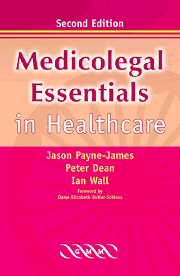Book contents
- Frontmatter
- Contents
- Contributors
- Editors' note for the first edition
- Editors' note for the second edition
- Foreword
- Table of statutes
- Table of cases
- 1 Legal institutions and the legal process
- 2 Human rights and healthcare professionals
- 3 Medical ethics and the forensic physician
- 4 Confidentiality
- 5 Consent to medical treatment
- 6 Professional bodies and discipline
- 7 Complaints in the National Health Service
- 8 The Mental Health Act (England and Wales)
- 9 Death certification and the role of the coroner
- 10 Tissues and organs
- 11 Organ donation
- 12 Living wills
- 13 Euthanasia and end-of-life decision-making
- 14 Abortion and reproductive health
- 15 The Children Act 1989
- 16 Clinical negligence
- 17 Legislation for medicines and product liability
- 18 Clinical trials: ethical, legal and practical considerations
- 19 Medicolegal implications of blood-borne viruses
- 20 Healthcare professionals in court – professional and expert witnesses
- Index
1 - Legal institutions and the legal process
Published online by Cambridge University Press: 12 January 2010
- Frontmatter
- Contents
- Contributors
- Editors' note for the first edition
- Editors' note for the second edition
- Foreword
- Table of statutes
- Table of cases
- 1 Legal institutions and the legal process
- 2 Human rights and healthcare professionals
- 3 Medical ethics and the forensic physician
- 4 Confidentiality
- 5 Consent to medical treatment
- 6 Professional bodies and discipline
- 7 Complaints in the National Health Service
- 8 The Mental Health Act (England and Wales)
- 9 Death certification and the role of the coroner
- 10 Tissues and organs
- 11 Organ donation
- 12 Living wills
- 13 Euthanasia and end-of-life decision-making
- 14 Abortion and reproductive health
- 15 The Children Act 1989
- 16 Clinical negligence
- 17 Legislation for medicines and product liability
- 18 Clinical trials: ethical, legal and practical considerations
- 19 Medicolegal implications of blood-borne viruses
- 20 Healthcare professionals in court – professional and expert witnesses
- Index
Summary
Few areas of healthcare practice are untouched by the law, and healthcare professionals will no doubt have some involvement with the legal process during their careers. This chapter seeks to provide an overview of the salient and relevant features of the legal system in England and Wales, in order to facilitate an understanding of the subject matter in the subsequent chapters.
Scotland and Northern Ireland enjoy their own legal traditions which, though distinct from that of England and Wales, share many similarities.
SOURCES OF LAW
Laws are rules that govern orderly behaviour in a collective society. The system which we call ‘the Law’, is an expression of the formal institutionalisation of the promulgation, adjudication, and enforcement of rules.
In England and Wales, the principal sources of these laws are Parliament and the decisions of judges in courts of law. Increasingly, however, rule-making powers are now the subject of delegation.
Parliamentary law
Parliament is the principal and pre-eminent organ of legislation in the UK. It is composed of the House of Commons, the House of Lords and the Monarch. In theory, the political and legal doctrine of ‘Parliamentary Sovereignty’, means that Parliament can pass any law it sees fit, and such laws cannot be altered by the courts.
- Type
- Chapter
- Information
- Medicolegal Essentials in Healthcare , pp. 1 - 10Publisher: Cambridge University PressPrint publication year: 2004

